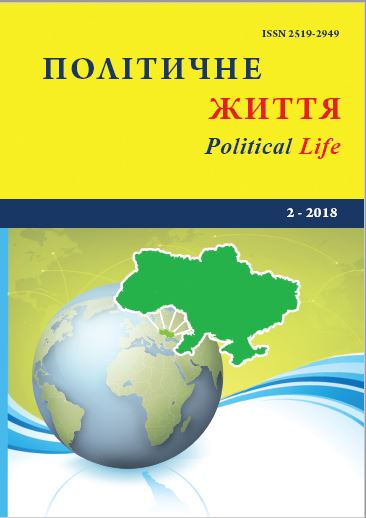Political corruption as a system of unlawful actions: the variability of manifestations.
DOI:
https://doi.org/10.31558/2519-2949.2018.2.8Keywords:
political corruption, electoral corruption, party corruption, lobbying corruption, representative corruption, patron-client corruption, judicial corruptionAbstract
The article argues that political corruption is a system of corruption abuses (political corrupt actions). The research aim is the author’s original approach to systematization of political corrupt actions, developing an original “corruption matrix of politics”. It is stated that the large number of political corruption manifestations is caused both by the significant range of subjects of potential political corrupt actions (political parties, electoral alliances, election commissions, etc.), and by the spheres in which the corruption abuses may occur (party financing, electoral process, lobbying, judicature, etc.).
The author-designed system of political corruption includes: 1) party corruption (violating the financing rules; making party decisions bypassing the mechanisms of intraparty democracy; creating “parties for sale”; selling high positions on party lists, which potentially allow getting a seat in parliament; using “fake donors” to bypass the limits on donations to parties, etc.); 2) electoral corruption (violating the rules of receiving money by electoral funds; various forms of vote buying; using administrative resources in the interests of certain subjects of elections); 3) lobbying corruption (non-transparent, shadow promotion of the interests of interested person in government authorities for remuneration); 4) representative corruption (changing the parliamentary faction by a member of parliament for mercenary motives, other actions in the sphere of political ethics, etc.); 5) patron-client corruption (using state resources to promote the interests of certain individual or collective actors; nepotism, cronyism, favoritism; actions related to the existence of a conflict of interests, etc.); 6) judicial corruption (execution of political orders by the organs of justice).
References
Бабкіна О. Патронаж // Політична енциклопедія / редкол.: Ю. Левенець (гол.), Ю. Шаповал (заст. гол.) та ін. ‒ К. : Парламентське видавництво, 2011. ‒ С. 546‒547.
Департамент з питань запобігання політичної корупції. [Електронний ресурс]. ‒ Режим доступу: https://nazk.gov.ua/departament-z-pitan-zapobigannya-politichnoyi-korupciyi
Лісничук О. Інституційні зміни політичної системи сучасної України: оцінка стану та напрями оптимізації: аналітична доповідь // Український парламентаризм: неформальний вимір формальних функцій / за ред Г. Зеленько. ‒ К. : Інститут політичних і етнонаціональних досліджень ім. І. Ф. Кураса, 2014. ‒ С. 25‒57.
Невмержицький Є. В. Корупція як соціально-політичний феномен : автореф. дис. … д-ра політ. н: 23.00.02 / Невмержицький Євген Васильович; НАН України, Ін-т політ. і етнонац. дослідж. ім. І. Ф. Кураса. ‒ К., 2009. ‒ 34 с.
Політична корупція в Україні: суб’єкти, прояви, проблеми протидії // Національна безпека і оборона. ‒ 2009. ‒ № 7.
Телешун Я. С. Клієнтелізм як складова функціонування фінансово-політичних груп / Я. С. Телешун // Політичне життя. ‒ 2017. ‒ № 3. ‒ С. 79‒83.
У КВУ застерігають від великої кількості штучних партій [Електронний ресурс]. ‒ Режим доступу http://www.pravda.com.ua/news/2016/09/29/7122140
Фісун О. Неформальні інститути та неопатримоніальна демократія в Україні / О. Фісун // Агора. ‒ 2016. ‒ № 17. ‒ С. 9‒13.

